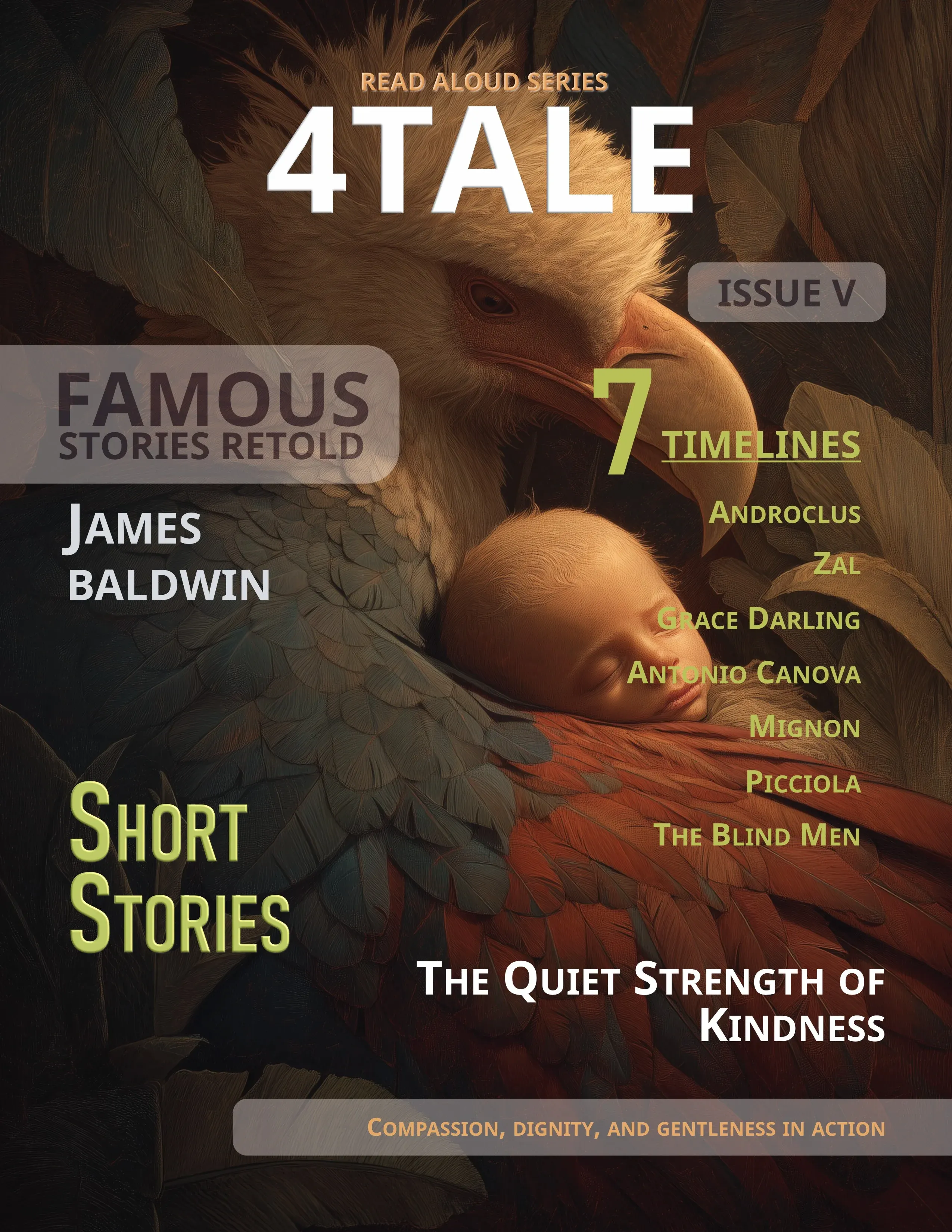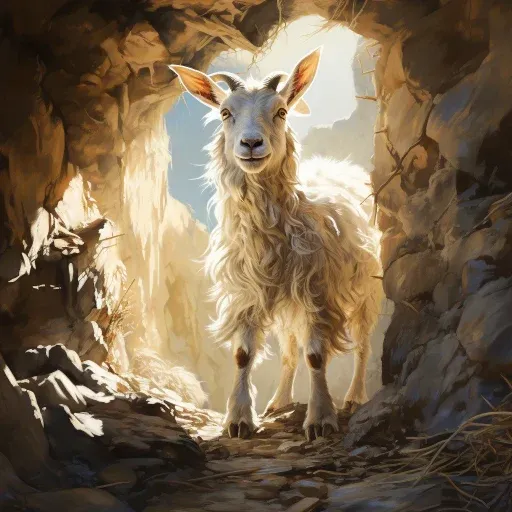There is a mountainous country in Persia which in olden times was called Seistan. Long, long ago—so long that nobody remembers the years—that country was ruled by a mighty king whose name was Saum.
Now, although Saum was rich and great, he was very unhappy; for he had no son to rule his kingdom after him. At length, however, a baby boy was born to him. This child was faultless in form and beautiful in face and limb, but his hair was like that of an old, old man—long, and white as snow.
The infant was eight days old before its father knew of its birth. For every one was afraid to tell the king lest he should be angry when he learned that his son was so strangely different from other children. But on the ninth day one of the women of the household gathered courage to go into the presence of mighty Saum.
She bowed herself to the earth before him and made it known that she wished to speak. And when the king had given her leave, she cried out:—
"May heaven's blessing rest upon Saum, the hero! May his days be long and full of joy! For a son is born to the king—a child faultless in form and beautiful in face and limb. His face is as fair as the full moon in its glory. His eyes are as glorious as the sun at its rising. He has not any blemish, save that his hair is like unto the hair of an old, old man—long, and white as snow. This child, O my master, is heaven's gift to thee. Let thy heart turn to him in love, and let thy thoughts be full of gratitude to God."
Then Saum arose and went into the women's house to see his child. And the nurse brought to him the moon-faced babe that was faultless in form and limb but had hair like unto the hair of an old, old man.
The king gazed long upon the helpless little one, and his heart turned to it in love and pity. But when he had gone out of the room his pride began to touch him. He thought how all the world would laugh at him because of this his only son, so strangely different from other children. The longer he thought, the more bitterly did he grieve, and his love was turned to shame and disappointment.
"Why has the Lord of Light given me such a son?" he cried. "When men see his white hair they will laugh at me. They will turn their backs upon him, and will not have him for their king. Better it would be if I had no son."
Thus spoke Saum, the hero; and, as the days went by, his heart was hardened because of his shame and disappointment. At length he called his trustiest servant, and bade him carry the child into some lonely place and leave it there to perish.
Now on the borders of Seistan, far from the homes of men, there is a mountain called Elburz. Its top reaches to the stars, and its sides are so steep that no man has ever climbed halfway to its dizzy summit. At the foot of this mountain the king's servant left the child. He left it lying in its princely robes and smiling at the blue sky above it.
High, on the topmost rock of the mighty mountain a wonderful bird had built her nest. Simurgh was the name of this bird, and her nest was a marvel to behold. She had made it of ebony and of sandalwood, and had twined it about with twigs of aloes. Inside and out, it was like a king's house for comfort and beauty.
For a thousand years this wise bird had had her home on that lofty mountain peak. There she breathed the pure air of the skies and talked with the twinkling stars. And she was learned in the wisdom of the ages and knew the language of men.
The Simurgh saw the helpless babe lying at the foot of the mountain. She saw him as the sun went down, and heard him crying from loneliness and hunger. She spread her wings and flew lightly down. She picked him up in her talons, and carried him to her lofty nest.
She had intended to give him to her nestlings to devour as they would devour a rabbit or a lamb. But when she saw how gentle and fair he was, and how faultless in form and limb, her heart was moved with pity.
"My children," she said, "I have brought you a rare and noble gift. Here is the son of the king. I bid you to do him no harm, but to love and treat him as your brother."
She chose the tenderest of food for her little guest. In her curved beak she brought him the milk of wild goats and honey from the home of the bees. She gave him ripe, sweet berries and whatever she could find that was good for a growing child. Her nestlings loved him as their brother, and shared with him all the pleasant things that were theirs in their lofty home.
Thus months and years went by. The Simurgh never grew tired nor slacked her care. And the white-haired babe grew into a prattling boy, and then into a youth, strong and beautiful.
II
One day some travelers were passing near the foot of Mount Elburz. They looked up and saw the great nest of the Simurgh midway between the earth and the sky. As they looked they beheld a youth walking on the rocky height and going in and out of the nest as though it were his home. The youth was fair of face and faultless in form, but his long, flowing hair was white as snow.
The travelers were filled with astonishment at what they saw, and went on, wondering, into Seistan. In every town they told of the strange sight they had seen, and the story soon spread through all the land. It was not long before a servant of the king heard it and it was repeated even to Saum, the hero.
Then one night Saum dreamed a dream. He thought that a horseman came riding from the mountains with news of the son he had so cruelly cast off. The horseman stood before him and reproached him, saying:—
"O foolish king, think now of your folly! You doomed your child to death for no other reason than that his hair was white. You feared the laughter of men; and still you are called a hero. Behold, you have been put to shame by a bird who has more pity and kindness than you for your own child. How long will you be so wicked, so cruel? Arise! Make haste to find your son."
Then Saum awoke, sad at heart and sorely grieved. He called his head men to his bedside and asked them about the youth who had been seen on Mount Elburz. And one of them who was bolder than the rest spoke up and bitterly reproached him.
"O hard-hearted king," he said, "you have been more cruel than even the tiger or the bear; for even they love their little ones and do not cast them off for some blemish. And you, unfeeling man, have rejected your child because of his white hair. Go forth quickly and repair the evil you have done. And if your child is still alive, take him to your heart and turn to the Almighty for forgiveness."
The king bowed himself to the earth in sorrow and shame. Then he gave orders that his fighting men should be put in readiness for marching. And the next day, at the head of a great army, with horses and camels and elephants, he set out for the mountains to look for his son.
When he drew near the foot of Mount Elburz, Saum lifted his eyes and beheld the nest of the Simurgh high on the topmost peak. And, as he looked, he saw the wise bird and a tall youth with flowing white hair looking down from the edge of the gray cliff. He knew then that this was his son, and he would have climbed the steep rock if such had been possible. But the most that he could do was to bow down in the dust and ask God for help.
And God heard him. For when the Simurgh saw that it was the king, she knew why he had come; and she said to the white-haired youth:—
"O nestling of my pride and love, the hour has come for us to part. For eighteen years I have been thy mother, and thou hast lived in this nest, while thy brothers have long ago flown away. But now thy father has come to seek thee; and a kingly throne is waiting for thee in Seistan, where thou shalt win great glory and renown."
Then the eyes of the youth were filled with tears.
"Art thou weary of me, my mother?" he said. "Am I no longer good enough for this fair nest? This home on the lofty mountain peak is better than a throne. Thy wings protect me better than an army of men. I wish no glory but to stay with thee."
But the Simurgh would not listen to his plea.
"It breaks my heart to give thee up," she said; "but another destiny is thine. Be brave, my son. Go forth and do the work which the world requires of thee."
Then she took him up in her talons and gently carried him down to the spot where the king was kneeling in prayer. The mighty hero lifted his head. Great was his joy when he saw the white-haired youth standing beside him. He bent low to the Simurgh and blessed her.
"O noblest of birds!" he cried. "O bird of heaven, by whom the wicked are put to shame! May great glory and endless life be thine!"
The bird made no answer, but flew up to her home on the lofty mountain peak. And as the king looked at his son, he saw that the youth was in every way worthy of admiration. Faultless he was in form and feature, and he had no blemish save his white hair. Proud, indeed, was the heart of the hero; and all his followers, when they saw the young man, shouted for joy.
Then the young man was clothed in princely garments. A sword was buckled to his side and a spear was put in his hand. And the king named him Zal, which means the Elder.
After this the army began its return to Seistan. The drummers, on mighty elephants, rode in front. The trumpets sounded, the cymbals were clashed together, the fifes were played, and sounds of joy filled the air; for Zal, the white-haired prince, was going home.
When the news reached Seistan, the city was dressed as for a holiday, and old and young went out with music and song to greet the new-found hero who was soon to be their king.
Then the wise men of the country came, and the young prince was placed in their care to be taught all that one so noble should learn. As the days went by, Zal grew wiser and wiser, until his wisdom was the talk of the world. Then Saum, too old and feeble to rule longer, gave up his kingdom to his son. And for many long years Zal reigned with such prudence and skill that men still talk of the golden age of the white-headed king.








